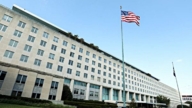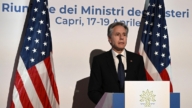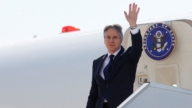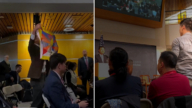【新唐人2013年12月04日讯】去年因为会见达赖喇嘛而触怒中共的英国首相卡梅伦,日前率贸易代表团抵达北京访华,引发了西方舆论一场有关“贸易重要还是人权重要”的讨论。多家英国媒体批评卡梅伦,为了追逐经济利益,用“谦卑”的姿态向中共“低头示好”,却对中共违反人权的状况保持沉默,这种放弃普世价值的做法,未必换来中共的尊重。
12月2号,英国首相戴维•卡梅伦率领英国最大的贸易代表团抵达北京,开始了对中国为期三天的访问。中共总理李克强在人民大会堂举行了欢迎仪式和新闻发布会,却禁止美国通讯社《彭博社》记者出席新闻发布会,同时忽视了“英国广播公司《BBC》”记者提出问题。
卡梅伦向李克强保证,英政府“承认西藏是中国的一部分,不支持‘西藏独立’。”在访华之前,卡梅伦也一再对中共示好,承诺英国将成为中国在欧洲最坚定的支持者。
而去年5月,卡梅伦曾不顾中共的警告与抗议,坚持与西藏流亡精神领袖达赖喇嘛会晤,因此遭到中共当局的谴责,并要求卡梅伦公开道歉,被卡梅伦拒绝。中共喉舌《环球时报》警告卡梅伦:必须为自己的行为“买单”。之后,有消息传出,中共不但减少了在英国的投资,还拒绝了卡梅伦今年上半年提出的访华要求。
有报导还指出,德国和法国都从中国拿到经济和贸易订单,使卡梅伦在国内受到巨大压力,因此才会争取访华,“解冻”中英关系。
分析认为,虽然卡梅伦没有公开道歉,但这次的访华之旅之所以成行,与他的妥协有很大关系。
时事评论家章天亮:“中共一直是利用经济利益拉拢各国政府,在民主社会,经济发展其实是选票一个很重要的来源,中共就利用这一个弱点,所以在经济上,如果你要向中共屈服的话,它可能会给你提供一些好处。”
对此,英国《每日电讯报》、《每日镜报》、《金融时报》等媒体纷纷刊登文章,批评卡梅伦放弃普世价值的做法。
《每日邮报》说,更值得关注的是,英国政府为了与中国的贸易,正在采取过于谦卑、避谈敏感问题、忽视中国人权的态度,这是非常危险的做法。
《金融时报》也批评,卡梅伦用放弃普世价值的方法,辛苦的讨好中共当局,,却不一定得到中共的尊重。文章还认为,卡梅伦不如坚持此前在达赖喇嘛和西藏问题上的强硬态度。
章天亮:“一般来讲,很多民主国家的元首,他们在上台之前的话,他们对中国的态度都是很强硬的。因为中共是一个践踏法制和人权的政权,所以说,他们在上台之前可能对中国的批评非常的严厉,但是一旦上台之后,他要考虑经济发展或者是一些外交关县,那么他在人权问题上就会软化很多 。”
《每日电讯报》指出:“英国正在变得为了融资和发展经济而丢弃崇高的精神”。文章还举例说,卡梅伦被中国的资金所吸引,所以主动出击,简化中国人的赴英签证,吸引中国投资。文章质问:我们在拿中国的钱,但我们是不是丢掉了灵魂?
时事评论家章天亮说,中共当局实际是外强中干,欺软怕硬的。他说,加拿大多年以来一直对中共的人权问题保持强硬的批判姿态,但中国并没有因此而减少与加拿大的贸易,因此,卡梅伦即使不妥协,英国的经济也不会因此受到什么影响。
采访编辑/张天宇 后制/钟元
British Prime Minister Criticized for Bowing to the CCP
Recently British Prime Minister David Cameron who enraged
the Chinese Communist Party (CCP) by meeting the Dalai Lama
last year arrived in Beijing leading a trade delegation.
This visit trigged a discussion of Western public opinion
on “Which Is More Important: Trade Or Human Rights?”
Many British media criticized Cameron’s bowing to the CCP
in order to chase economic interests whileremaining silent on
CCP violation of human rights.
His action to abandon universal values may not get the
CCP’s respect in return.
On December 2, British Prime Minister David Cameron arrived
in Beijing leading Britain’s largest trade delegation to begin a
three-day visit to China.
Chinese Premier Li Keqiang held a welcoming ceremony
and a press conference at the Great Hall.
U.S. news agency Bloomberg reporter was prohibited from
joining the press conference, and questions from a BBC
reporter were ignored.
Cameron told the British parliament – sending a message to
Bejing – that:"We recognize Tibet as part of China. We do
not support Tibetan independence."
Before his trip to China Cameron also repeatedly showed
friendship to the CCP and promised the UK would become
China’s strongest supporter in Europe.
Last May Cameron insisted his meeting with the exiled Tibetan
spiritual leader the Dalai Lama in spite of the CCP’s warnings
and protests.
Cameron was condemned by the CCP, but he refused to give
the CCP their demanded public apology.
CCP mouthpiece Global Times warned Cameron
must “pay" for his behavior.
Accordingly soon after CCP not only reduced UK investment
but also refused Cameron’s request to visit China in H1.
It was reported as Germany and France both got economic and
trade orders from China, Cameron received huge pressure from
within the UK. So he made an effort to visit China to “defrost"
the China and UK relationship.
Analysts point out although Cameron did not make a public
apology, this trip has a lot to do with his compromises.
Commentator Zhang Tianliang: “The CCP has been using
economic interests to draw other countries.
In a democratic society, economic development is actually
a very important source of votes.
The CCP takes advantage of this vulnerability. If you yield to
it, it may give you some economic benefits."
UK’s Daily Telegraph, Daily Mirror and The Financial Times
all published articles critical of Cameron’s behavior to give up
universal values.
The Daily Mail felt that: “We are in danger of adopting too
humble and unquestioning approach" to China by focusing
on trade not human rights."
The Financial Times also criticized:
“The answer, of course, is that abandoning the defence of
universal values in the hopes of more market access or better
political relations is an even less effective way of earning the
respect of China’s leaders or anyone else."
Zhang Tianliang: “In general, many leaders of democratic
countries, before they came to power, had very tough attitude
to the CCP because the CCP regime violates rule of law and
human rights.
But once they are on the stage, they are much softer on the
issue of human rights as they have to consider economic
development and diplomatic relations."
A blog by the Telegraph pointed out that the UK is discarding
values in order to collect financing capital for infrastructure.
The article also indicated Cameron was attracted by China’s capital
and took the initiative to simplify the visa process for Chinese.
Zhang Tianliang said the CCP is actually weak.
It bullies the weak and is afraid of the strong.
He said that Canada has been seriously criticizing the CCP
on human rights issues over the years, but China has not
reduced trade with Canada.
So even if Cameron did not compromise,
the British economy would not be affected.
Interview & Edit/Zhang Tianyu Post-Production/ZhongYuan




























